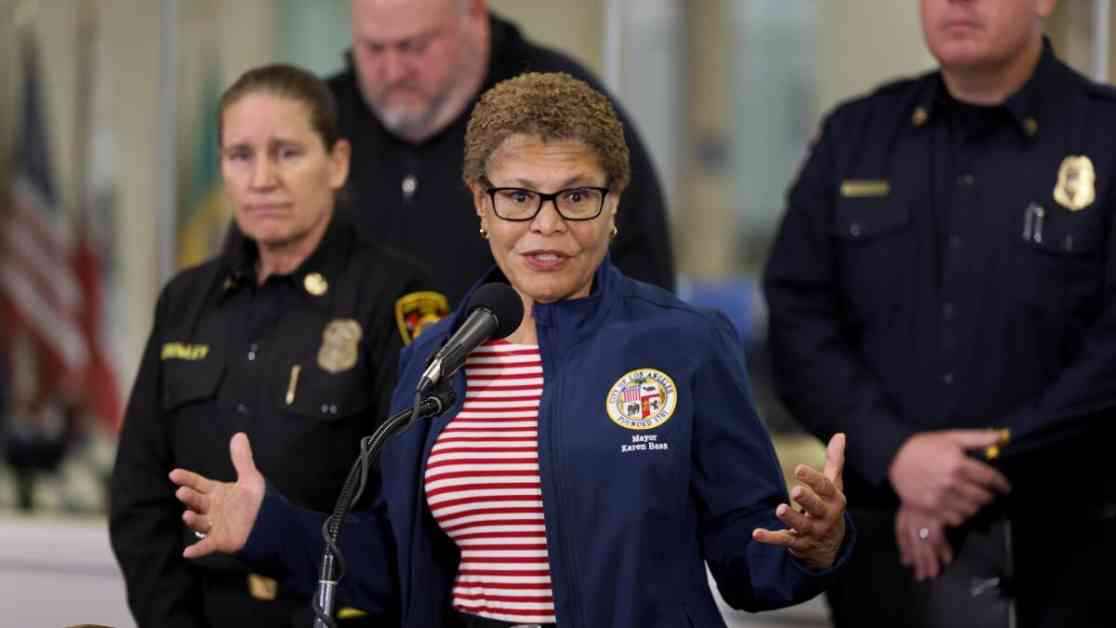The day before Mayor Karen Bass embarked on her trip to Ghana, her aides received a concerning email from the city’s Emergency Management Department. The message warned of an impending high risk of damaging winds and elevated fire conditions in the upcoming week. Despite the ominous forecast, Mayor Bass proceeded with her journey, attending the inauguration of the Ghanaian president and a U.S. Embassy event on January 7, the same day the Palisades fire ignited. Surprisingly, her team did not inform her about the email they received on Friday, January 3, which highlighted a meeting scheduled for the following Monday to coordinate preparations for the anticipated severe weather conditions.
In the days leading up to Mayor Bass’s departure, the National Weather Service also began alerting the public via social media about the escalating wildfire threat. As the situation unfolded, Mayor Bass pointed fingers at former Fire Chief Kristin Crowley for failing to forewarn her about the potential catastrophic wind event. She expressed regret to Fox 11, stating that had she been aware of the fire danger, she would not have traveled as far as San Diego, let alone to Ghana. The mayor went on to terminate Crowley on February 21, citing shortcomings in the chief’s response to the Palisades fire, which resulted in significant property damage and loss of lives.
Subsequent correspondence obtained through a public records request revealed that the Emergency Management Department had been actively communicating with mayoral staff regarding the weather outlook. The January 3 email and subsequent messages conveyed increasingly dire forecasts, emphasizing the urgency of the situation. More than a dozen of Mayor Bass’s aides were included in the distribution of the January 3 email, which contained multiple attachments from the National Weather Service, detailing the impending fire risk.
Adverse Weather Alert: Early Warnings Ignored
Deputy Mayor Zach Seidl, responsible for overseeing communications for Mayor Bass, downplayed the significance of the January 3 email, highlighting that it did not imply an imminent disaster. He clarified that the message merely indicated a tentative meeting, rather than a clear warning of impending calamity. EMD spokesperson Joseph Riser further clarified that the term “tentative” referred to the scheduling of the meeting, not its certainty.
The detailed attachments accompanying the January 3 email from Jillian de Vela, an EMD duty officer, included a 10-page forecast from the National Weather Service. The forecast illustrated a significant fire risk, with wind gusts potentially reaching 80 mph, coupled with low humidity and dry vegetation, particularly jeopardizing L.A. and Ventura counties. Notably, the email also included a graphic featuring a large red flame icon, signifying “Critical fire conditions” on January 7.
Preventable Tragedy: Lack of Communication
In the wake of the Palisades fire and the subsequent revelations, questions arose regarding the communication protocols within Mayor Bass’s office and the Emergency Management Department. Despite the detailed warnings and forecasts provided by the National Weather Service, Mayor Bass and her immediate staffers were not apprised of the escalating fire danger before her departure for Ghana.
The failure to relay critical information to the mayor raises concerns about the internal communication channels and the decision-making process within the mayor’s office. While Deputy Mayor Seidl downplayed the urgency of the January 3 email, citing it as a routine communication, the gravity of the subsequent events underscores the importance of timely and accurate information dissemination during crisis situations.
As the investigation into the handling of the Palisades fire continues, the spotlight remains on the accountability of city officials and the efficacy of emergency response measures. The unfortunate sequence of events serves as a stark reminder of the critical role communication plays in mitigating and responding to natural disasters and emergencies. In hindsight, the lack of proactive communication and preparedness measures may have contributed to the severity of the fire and its devastating consequences.
The narrative of Mayor Karen Bass’s ill-fated journey to Ghana serves as a cautionary tale, highlighting the repercussions of disregarding early warnings and failing to prioritize public safety. The incident underscores the need for robust communication protocols, effective coordination among stakeholders, and proactive measures to address emergent threats. As the city grapples with the aftermath of the Palisades fire, lessons must be learned, and corrective actions taken to prevent similar oversights in the future.


